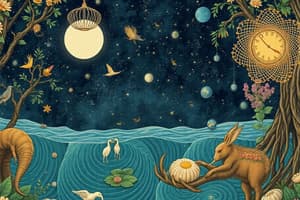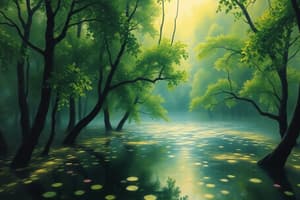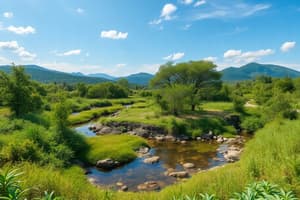Podcast
Questions and Answers
What is a nutrient?
What is a nutrient?
- A chemical substance that an organism produces internally for its survival
- A chemical compound found in the atmosphere
- A chemical substance that an organism must obtain from its environment to sustain life (correct)
- Any substance that takes up space and has mass in an organism
What is the role of algae and plants in the food chain?
What is the role of algae and plants in the food chain?
- Decomposers in the food chain
- Predators in the food chain
- Highest level of the food chain
- Lowest level of the food chain (correct)
What does the law of conservation of mass state?
What does the law of conservation of mass state?
- Matter is not created or destroyed, it is conserved (correct)
- Matter is constantly changing its form
- Matter is only conserved in living organisms
- Matter can be created and destroyed
What provides the nutrients needed for organisms to function?
What provides the nutrients needed for organisms to function?
What is the inefficiency in the energy transfer at higher levels of the food web attributed to?
What is the inefficiency in the energy transfer at higher levels of the food web attributed to?
What is the role of nutrients in organisms?
What is the role of nutrients in organisms?
What does the law of conservation of mass state?
What does the law of conservation of mass state?
What is the primary role of algae and plants in the food chain?
What is the primary role of algae and plants in the food chain?
What happens to matter and energy as they move through an ecosystem?
What happens to matter and energy as they move through an ecosystem?
What provides the nutrients needed for organisms to function?
What provides the nutrients needed for organisms to function?
Flashcards
Nutrient role
Nutrient role
Nutrients are chemical substances organisms need from their environment for life.
Algae/Plant food chain role
Algae/Plant food chain role
Algae and plants are the base of most food chains, producing food.
Law of Conservation of Mass
Law of Conservation of Mass
Mass is neither created nor destroyed; it is transformed.
Food web inefficiency
Food web inefficiency
Signup and view all the flashcards
Matter in ecosystems
Matter in ecosystems
Signup and view all the flashcards
Ecosystem nutrient source
Ecosystem nutrient source
Signup and view all the flashcards
Study Notes
Nutrients and Energy Transfer
- A nutrient is a substance that provides nourishment essential for an organism's growth, maintenance, and survival.
- Algae and plants play a primary role in the food chain as producers, converting sunlight into chemical energy through photosynthesis.
- The law of conservation of mass states that matter cannot be created or destroyed, only transformed or converted from one substance to another.
Energy Transfer and Nutrient Cycling
- Nutrients are essential for organisms to function, providing the necessary building blocks for growth, development, and maintenance.
- The inefficiency in energy transfer at higher levels of the food web is attributed to the loss of energy as heat, a result of the second law of thermodynamics.
- As matter and energy move through an ecosystem, they are transformed and transferred from one level to the next, with some energy being lost as heat.
Key Roles and Processes
- Algae and plants are the primary producers of the food chain, providing the nutrients needed for organisms to function.
- The law of conservation of mass ensures that matter is cycled and recycled within an ecosystem, with nutrients being reused and transformed.
- Energy is transferred from one level to the next in the food web, with some energy being lost as heat, resulting in a decrease in available energy at higher levels.
Studying That Suits You
Use AI to generate personalized quizzes and flashcards to suit your learning preferences.




